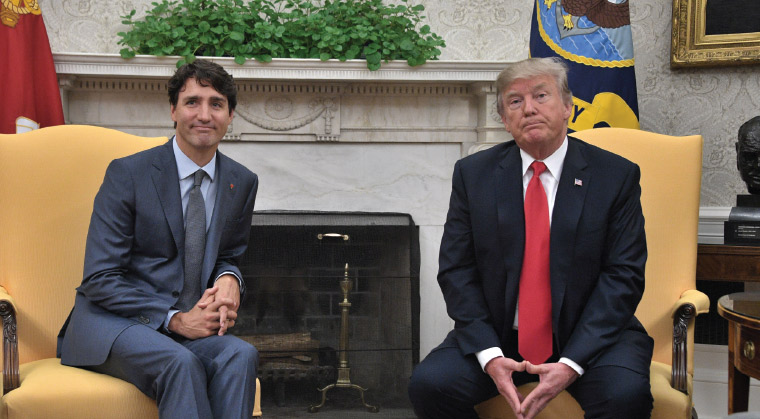Beating the Trade War Drums


Photos: AFP/IMAGEBANK
Call it the Tweet shot across the bow.
President Trump’s missive upon departure from the G7 summit in Canada, and his refusal to sign the final summit communique, could set off an all-out trade war. At the very least, the president is showing that he’s willing to alienate America’s closest trading partners.
By June 15, Trump is expected to publish a list of Chinese technological products worth $50 billion on which America will slap a 25% tariff. That comes after US Commerce Secretary Wilbur Ross announced last week that the administration would levy 25% tariffs on steel imports from Europe, Canada, and Mexico, and 10% tariffs on aluminum imports. Trump justified the move by insisting the tariffs are necessary for national security. According to the administration, low steel prices threaten the native steel industry. What’s more, a weak domestic steel industry means the US must import most of its steel, posing a potential threat to the production of weapons. Steelworkers, like many other blue-collar workers, are considered Trump’s voter base.
Not surprisingly, Europe, Canada, and Mexico are furious. Europe announced that by June 20, it would publicize its own list of retaliatory measures, worth some $3.3 billion. At the same time, those nations lodged a complaint with the World Trade Organization.
But this is a battle Trump doesn’t intend to lose. Steelworkers, along with coal miners and farmers, voted Trump into power. So if that means insulting Canadian leader Justin Trudeau or accusing America’s close allies of treating the country like their “piggy bank” — so be it.
Trump’s conduct is also the latest reminder that his tactics are unorthodox, but effective. Even as the press pilloried his controversial statements and conduct, he was carried to office in 2016. So too today, when it seems clear that America is on a collision course with its allies over trade.
EU countries that export the most goods to the US (in euros):
- Germany — €112 billion
- Britain — €52 billion
- Italy — €40 billion
- France — €34 billion
- Ireland — €32 billion
EU countries that import the most goods from the US (in euros):
- Britain — €53 billion
- Germany — €45 billion
- Holland — €35 billion
- France — €28 billion
- Belgium — €25 billion
Goods that the US and the EU trade most:
- Cars and motorcycles
- Aircraft and equipment
- Medications
- Motors
- Medical apparatus
- Fuel
(Excerpted from Mishpacha, Issue 714. Statistics courtesy of the European Union, as of 2017)
Oops! We could not locate your form.













